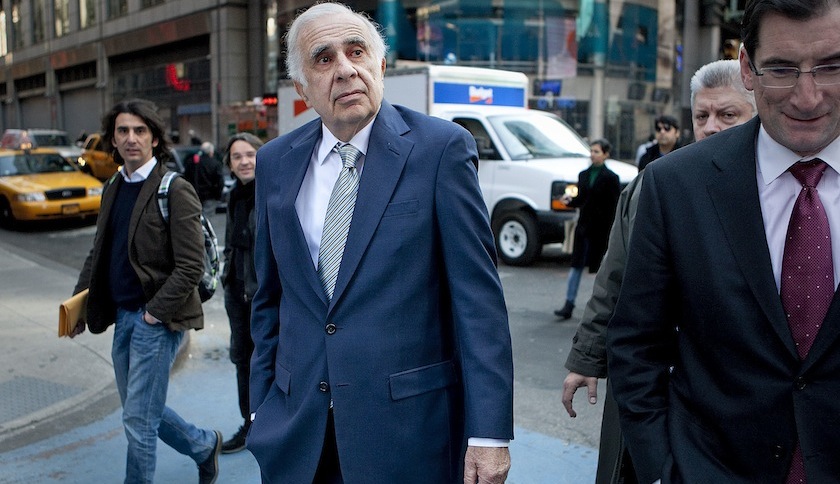Carl Icahn is playing a central role in his own version of Boardwalk Empire. Only in this series, Atlantic City is a hollowed out Jersey town. The “business”—the Taj Mahal casino—is begging for Icahn’s help.
The “people” are storming the mayor’s office, pleading for the city to subsidize the casino in a way that might encourage Icahn, the last deep-pocketed investor with one foot out of town, to save a $350 million investment he can afford to give up.
Whether Icahn becomes the script’s hero is mostly irrelevant to him, financially speaking. But to the iconic gambling town, it’s another story.
Atlantic City is a grim place these days. Over the past year, four casinos have closed, including the Revel, Atlantic City’s newest. The Taj, which is at the center of a bankruptcy battle that has heated up in the last two weeks, could be the fifth to close this year if Icahn doesn’t agree to invest another $100 million in the casino. If it is shuttered, only seven gambling properties in Atlantic City will remain open.
Most of the city’s big financial backers walked away years ago and haven’t looked back. “I haven’t been to Atlantic City in many years. I got out a long time ago — great timing,” Donald Trump, original owner of the Taj Mahal, recently told Real Estate Weekly.
Icahn was the last one to see an opportunity. He bought a loan from Dallas-based billionaire Andy Beal in late 2009, around the time Trump bowed out. Shortly after, Icahn bought Tropicana Casino & Resort when it was coming out of bankruptcy.
While Tropicana has been somewhat of a turnaround story, the prospects for the Taj and Atlantic City are generally terrible. Gambling revenue fell 45% in the seven years through 2013, according to the Center for Gaming Research. Since 1984, slots out-earned tables, suggesting that high rollers aren’t the ones hitting the floors.
“Since the mid-1980s, table revenues have been stagnant; adjusting for inflation, they’ve seen a large decline,” according to the Center. “Slot gaming has historically been more robust, and its current decline, which predates the recession, is cause for concern.”
The number of visitors to Atlantic City fell in 2013 for the eighth year in a row. The city had 26.7 million visitors, down 2% from the previous year but sliced from the 35 million visitors the city had in 2005, according to figures released by the Lloyd D. Levenson Institute of Gaming, Hospitality and Tourism at the Richard Stockton College of New Jersey.
The Taj itself is losing $7 million a month and needs $100 million to give it a chance at attracting the shrinking number of gamblers grazing the city’s casinos.
The casino’s dire prospects are even enough to shake Icahn. “The Taj is in far worse financial shape than almost any company I have ever analyzed,” he said last week in a letter to the casino’s union employees. In a later conversation with Coins2Day about Atlantic City, Icahn said, “Gambling is getting smaller and smaller with major competition building.”
From a pure numbers standpoint, it makes sense for Icahn to walk away. Though he holds a $350 million loan, he bought that at a discount. Over time, he’s taken out insurance on the loan, which helps to mitigate losses. He’s been pocketing interest over the past several years, and he is first in line for all the assets of the casino—including its property value—if it is liquidated. Further, his standing investment in Tropicana will benefit as others on the Boardwalk drop off. “Think of it as a pie that is getting smaller and smaller,” he said.
Atlantic City has more to lose—at its heart, 3,000 jobs at the casino, which will be difficult to replace.
A little over a month ago, Taj Mahal’s management went to Icahn saying they couldn’t find another investor. They would be out of cash in a few months if someone didn’t help. At the time, Icahn told management he had no interest in lending a hand.
“However, they did not give up and spent several days trying to convince me that if they could obtain certain enumerated concessions from the union, state and city, they believed that, with a $100 million investment from me, there would be a good chance that the Taj Mahal could avoid closing,” Ichan said.
Eventually—against the counsel of his advisors, he said—Ichan finally agreed to the investment on the condition that the concessions come through.
Earlier this week, employees asked the city and state for $175 million to keep the Taj from closing. Icahn also wants union employees to accept cuts to their healthcare plan. It’s a move the union has fought hard.
Not to be outshouted, Icahn has fired back. “It’s unbelievable to me that the union is somehow blaming me that the Taj may close,” he said in a statement several weeks ago, after the union initially took aim.
Almost on script, the union took a swipe in return. “The most important thing to [Icahn] is for workers to lose their healthcare so that he can grab another nickel from people who make less than $12.50 an hour,” said union president Bob McDevitt on Monday in a statement he sent to CNNMoney. “[Icahn] wants taxpayers to pick up the [healthcare] tab.”
In the end, Icahn can walk away, leaving Atlantic City employees without work or the storied casino that opened in 1990. The Taj is set to shut at the end of the year, barring further investment. For now, Icahn stands as the lone billionaire on the boardwalk. Will the empire crumble?












